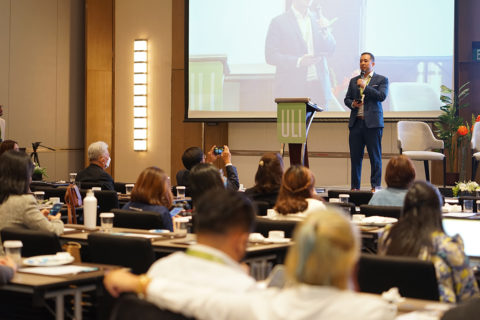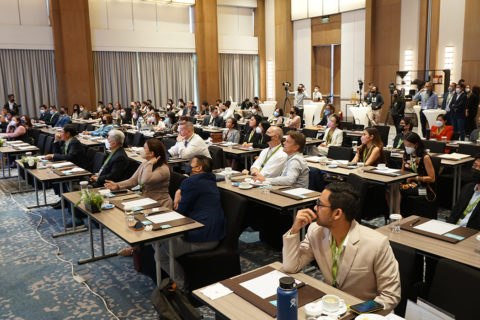Top Story
Fast Forward: New Communities and Developments
The magic of new beginnings was evident on the stage as the first hybrid webinar event of the ULI Philippines Women's Leadership Initiative
30 June 2022
NEO Chief Executive Officer and Urban Land Institute Philippines Executive Committee member Raymond Rufino lauded the successful in-person return of the 2022 ULI Philippines Conference, following a two-year break.
In his closing remarks on Thursday, June 23, Rufino graciously thanked the attendees for their continued support of the event.
“We’ve been dying to have an in-person event for ULI for quite some time, so we’re so happy to get everyone together here,” he said.
He also extended his gratitude to the team behind the event for actively organizing the conference in the Clark Marriott Hotel at the rising New Clark City, Pampanga– calling the choice of venue a “refreshing change”.
With the theme of “Past, Present & Future – Evolution of Cities”, Rufino cited ULI’s mission “to shape the future of the built environment for transformative impact for communities worldwide” as a core principle that guided the event.
In encapsulating the event’s goal, Rufino borrowed the words of one of the event’s keynote speakers, Hwang Yu Ning, the Chief Planner of Singapore’s Urban Redevelopment Authority, who shared “We are making choices today for tomorrow”.
The conference itself was split into three distinct parts, with each segment exploring the past, present and future of urban development.
To properly explore the cultural heritage and untapped potential of today’s cities, ULI Philippines invited an impressive line-up of global industry experts, business leaders and scholars to impart their insights on the dynamic field of city planning.

Key Takeaways
Commencing with an opening keynote from the distinguished Danish urban planner Jan Gehl who was virtually chiming in from Copenhagen, the event’s attendees were treated with his professional insight on how to make modern cities livable, sustainable and healthy.
Gehl, in line with the event’s theme, said “You should listen to history where we have always had lively, humanistic cities”.
This was followed by a keynote address from the Political Counselor at the British Embassy Manila Rebecca Shah, who detailed the efforts of the Global Future Cities Programme– a project which the British government continuously invests in as part of their advocacy to bridge the investment gap in low-income countries.
Among the cities receiving funding from the program are Cebu City and New Clark City.
“These urban centers represent enormous potential for future prosperity and sustainable development. Within them is the opportunity to address educational opportunities, wealth and job creation for men and women, and to reduce inequality”, she said of the projects in development.
The series of panel sessions began with a discussion about preserving and honoring Filipino cultural heritage sites. The panelists include Filipino architect and cultural studies scholar Gerard Rey Lico, Spanish-born architect and Estudio Arkipelago principal Endika Ampudia, renowned Filipino historian Michael Charleston “Xiao” Chua, and Quezon City Tourism Department representative Ma. Teresa Tirona.
Prior to the panel, Arch. Lico first presented his hometown of Valenzuela as a case study for the preservation of historical architecture, specifically its rehabilitation of Fatima Ave. and Arkong Bato. Both of which he was closely involved in.
In his exploration of why these places are worth preserving, he said “A space is nothing if it doesn’t have memory and memory is defined by the history and the past of a place”.
Meanwhile, the second panel session was conducted with the participation of Philippine Disaster Resilience Foundation Executive Director Veronica Gabaldon, Bases Conversion Development Authority Executive Vice President Aileen Zosa, Australia-based architect Simon Parsons of PTW, Ninety Design Studio Founder Aris Go, and moderated by Liveable Cities Challenge Chairman Bill Luz.
The panel detailed the various ways in which modern cities can become more resilient and more sustainable. In their discussion of disaster-proofing city structures, they all shared the belief that sustainability must be rooted in a city’s master plan to ensure that no areas are left behind in the process of development.
This was succeeded by a keynote speech from the aforementioned Hwang Yu Ning, who was chiming in from Singapore and laid out the city-state’s process in crafting and reviewing their urban development plans.
“We are trying to look at how to enhance integration of heritage and also strengthen our existing faces of identity, and creating new ones as well”, she said of their current planning goals.
According to Hwang, Singapore is currently undertaking several key projects post-pandemic such as increasing the flexibility of their commercial spaces in the likelihood that virtual work continues to be prevalent.

Moving Forward
Lastly, the third panel session focused on the future of real estate and property technologies, which was joined by Dubai-based architect and LWK + Partners Managing Director Kerem Cengiz, KERB CEO Rob Brown, Daikin Deputy Division Manager Wesley Chu, and Umpisa President and Co-Founder Pam Belen. The discussion was moderated by AECOM Business Lead Sylvester Wong.
The panel, when asked to envision the city of the future, visualized an environment that leverages on the innovations and data of today to become more adaptable to change, more human-centered, and more inclusive.
To wrap up the day’s proceedings, Rufino asked the attendees to mull over the question, “Can we draw on our past and our heritage to inform and influence the choices we make today to build the future we want to live in for our cities where we will hopefully live happy and healthy lives for us and our children?”.
Although the vision of livable cities across the globe remains unclear without the collective will to realize it, given the breadth of knowledge imparted by these key industry leaders, the dream for walkable, healthy cities in the Philippines may be one step closer to reality.
Don’t have an account? Sign up for a ULI guest account.